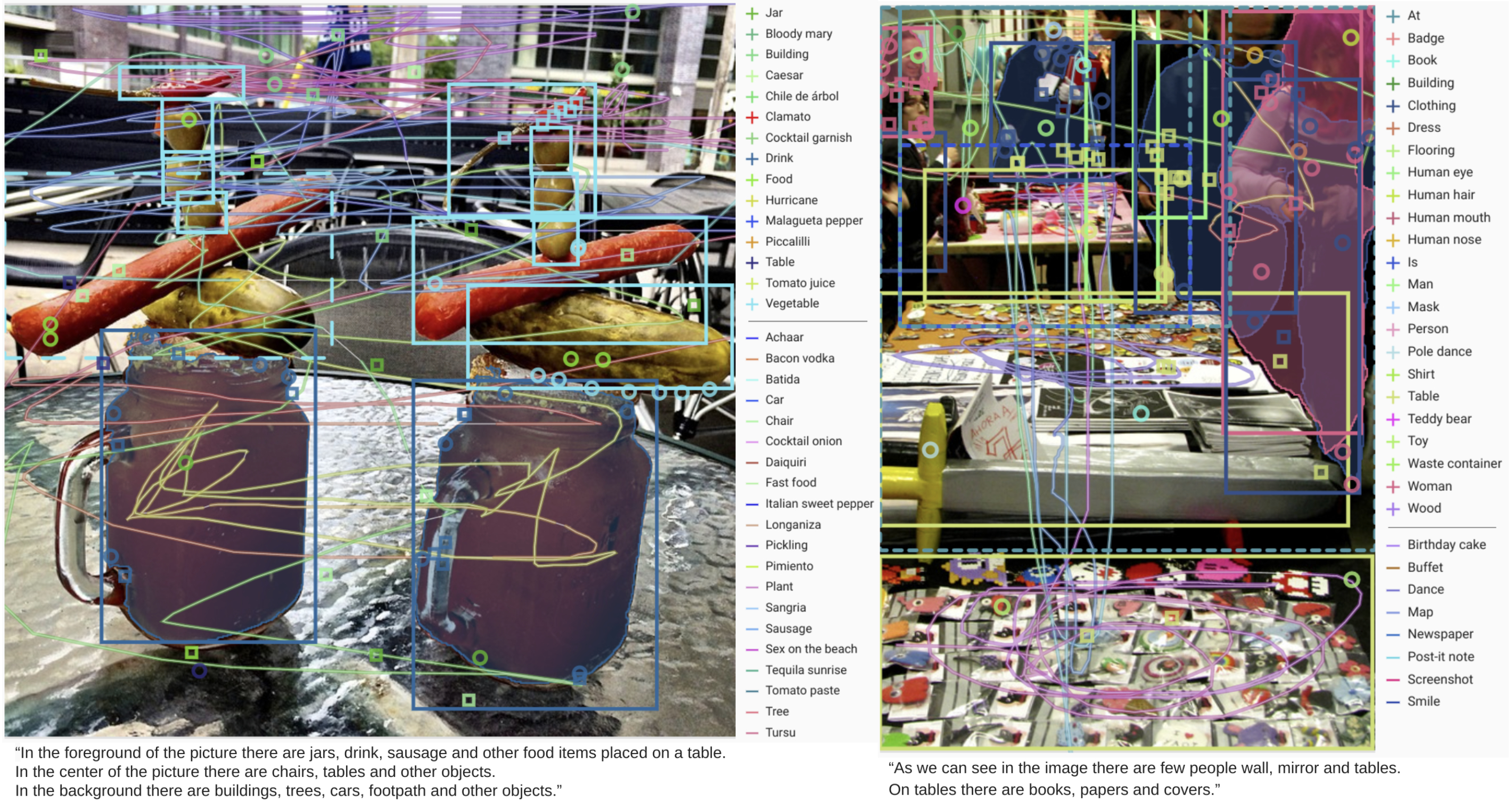6.0 KiB
| comments | description | keywords |
|---|---|---|
| true | Dive into Google's Open Images V7, a comprehensive dataset offering a broad scope for computer vision research. Understand its usage with deep learning models. | Open Images V7, object detection, segmentation masks, visual relationships, localized narratives, computer vision, deep learning, annotations, bounding boxes |
Open Images V7 Dataset
Open Images V7 is a versatile and expansive dataset championed by Google. Aimed at propelling research in the realm of computer vision, it boasts a vast collection of images annotated with a plethora of data, including image-level labels, object bounding boxes, object segmentation masks, visual relationships, and localized narratives.
Key Features
- Encompasses ~9M images annotated in various ways to suit multiple computer vision tasks.
- Houses a staggering 16M bounding boxes across 600 object classes in 1.9M images. These boxes are primarily hand-drawn by experts ensuring high precision.
- Visual relationship annotations totaling 3.3M are available, detailing 1,466 unique relationship triplets, object properties, and human activities.
- V5 introduced segmentation masks for 2.8M objects across 350 classes.
- V6 introduced 675k localized narratives that amalgamate voice, text, and mouse traces highlighting described objects.
- V7 introduced 66.4M point-level labels on 1.4M images, spanning 5,827 classes.
- Encompasses 61.4M image-level labels across a diverse set of 20,638 classes.
- Provides a unified platform for image classification, object detection, relationship detection, instance segmentation, and multimodal image descriptions.
Dataset Structure
Open Images V7 is structured in multiple components catering to varied computer vision challenges:
- Images: About 9 million images, often showcasing intricate scenes with an average of 8.3 objects per image.
- Bounding Boxes: Over 16 million boxes that demarcate objects across 600 categories.
- Segmentation Masks: These detail the exact boundary of 2.8M objects across 350 classes.
- Visual Relationships: 3.3M annotations indicating object relationships, properties, and actions.
- Localized Narratives: 675k descriptions combining voice, text, and mouse traces.
- Point-Level Labels: 66.4M labels across 1.4M images, suitable for zero/few-shot semantic segmentation.
Applications
Open Images V7 is a cornerstone for training and evaluating state-of-the-art models in various computer vision tasks. The dataset's broad scope and high-quality annotations make it indispensable for researchers and developers specializing in computer vision.
Dataset YAML
Typically, datasets come with a YAML (Yet Another Markup Language) file that delineates the dataset's configuration. For the case of Open Images V7, a hypothetical OpenImagesV7.yaml might exist. For accurate paths and configurations, one should refer to the dataset's official repository or documentation.
!!! Example "OpenImagesV7.yaml"
```yaml
--8<-- "ultralytics/cfg/datasets/open-images-v7.yaml"
```
Usage
To train a YOLOv8n model on the Open Images V7 dataset for 100 epochs with an image size of 640, you can use the following code snippets. For a comprehensive list of available arguments, refer to the model Training page.
!!! Warning
The complete Open Images V7 dataset comprises 1,743,042 training images and 41,620 validation images, requiring approximately **561 GB of storage space** upon download.
Executing the commands provided below will trigger an automatic download of the full dataset if it's not already present locally. Before running the below example it's crucial to:
- Verify that your device has enough storage capacity.
- Ensure a robust and speedy internet connection.
!!! Example "Train Example"
=== "Python"
```python
from ultralytics import YOLO
# Load a COCO-pretrained YOLOv8n model
model = YOLO('yolov8n.pt')
# Train the model on the Open Images V7 dataset
results = model.train(data='open-images-v7.yaml', epochs=100, imgsz=640)
```
=== "CLI"
```bash
# Train a COCO-pretrained YOLOv8n model on the Open Images V7 dataset
yolo detect train data=open-images-v7.yaml model=yolov8n.pt epochs=100 imgsz=640
```
Sample Data and Annotations
Illustrations of the dataset help provide insights into its richness:
- Open Images V7: This image exemplifies the depth and detail of annotations available, including bounding boxes, relationships, and segmentation masks.
Researchers can gain invaluable insights into the array of computer vision challenges that the dataset addresses, from basic object detection to intricate relationship identification.
Citations and Acknowledgments
For those employing Open Images V7 in their work, it's prudent to cite the relevant papers and acknowledge the creators:
!!! Quote ""
=== "BibTeX"
```bibtex
@article{OpenImages,
author = {Alina Kuznetsova and Hassan Rom and Neil Alldrin and Jasper Uijlings and Ivan Krasin and Jordi Pont-Tuset and Shahab Kamali and Stefan Popov and Matteo Malloci and Alexander Kolesnikov and Tom Duerig and Vittorio Ferrari},
title = {The Open Images Dataset V4: Unified image classification, object detection, and visual relationship detection at scale},
year = {2020},
journal = {IJCV}
}
```
A heartfelt acknowledgment goes out to the Google AI team for creating and maintaining the Open Images V7 dataset. For a deep dive into the dataset and its offerings, navigate to the official Open Images V7 website.

